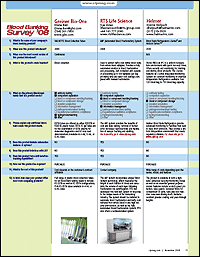Beckman Coulter, Brea, Calif., has launched Access SARS-CoV-2 IgG (1st IS), a fully quantitative lab-based Immunoglobulin G (IgG) serology test that measures the quantity of antibodies against the virus that causes COVID-19. The newest addition to the company’s suite of COVID-19 solutions, this high-quality assay is traceable to the 1st WHO International Standard for anti-SARS-CoV-2, 20/136 and reports results directly aligned with BAU/mL (Binding Antibody Units) established by the World Health Organization. As the pandemic continues its global assault, even while vaccinations are being rolled out, serology testing is emerging as a test with public health and clinical utility for monitoring and responding to the COVID-19 pandemic and caring for patients.
“Serology testing has wide-ranging clinical utility currently, as well as in a post-vaccinated world. For example, according to the CDC, antibody testing may be useful to support a diagnosis of a previous COVID-19 illness,” says Shamiram R. Feinglass, MD, MPH, chief medical officer for Danaher Diagnostics and Life Sciences. “With a quantitative assay such as the IgG (1st IS), physicians can now compare results to a standard and look across populations.”
The Clinical Utility of COVID-19 Serology Testing
Beckman Coulter launched its first COVID-19 IgG and IgM tests in 2020 during the initial outbreak. The tests were designed to qualitatively detect antibodies produced against the spike protein of the SARS-CoV-2 virus as they were strongly suspected to be neutralizing. Following the launch, the company delivered highly accurate IgG and IgM tests to provide reliable information for both individual health decisions as well as population-based immunity monitoring.
“With the launch of a fully quantitative COVID-19 IgG assay, we [can] determine seroprevalence in a population and also help determine the quantity of antibodies in individuals over time, which wasn’t possible before because we didn’t have standardization across quantitative serology tests,” says Bernard Cook, PhD, division head of chemistry and director of operations of the core automated laboratory, Henry Ford Hospital in Detroit. “Now, and in a post-vaccinated world, these assays are going to help physicians better understand the immune response of patients who develop COVID-19 infections, those who have post-acute sequelae of COVID-19 and in assessing response to vaccination to SARS-CoV-2.”
Access SARS-CoV-2 IgG (1st IS)
In a clinical study, Beckman Coulter’s Access SARS-CoV-2 IgG (1st IS) quantitative test showed a clinical performance of 100% Positive Percent Agreement/Sensitivity (exclusion of false negatives) and 99.8% Negative Percent Agreement/Specificity (exclusion of false positives) in patients tested >/=15 days or more post-symptom onset. “Laboratory testing remains a powerful tool in our fight against the pandemic,” says Chris Hagen, global vice president of the COVID-19 task force at Beckman Coulter. “The Access SARS-CoV-2 IgG (1st IS) assay may be used to inform clinicians about changes in antibody levels over time. This virus continues to evolve, which is why we are continually developing diagnostic solutions to help physicians save lives.”
Beckman Coulter has more than 16,000 immunoassay analyzers worldwide. Just like all of Beckman Coulter’s COVID-19 assays, the Access SARS-CoV-2 IgG (1st IS) test can be used in random access mode (RAM) and seamlessly integrated into existing workflows without batch processing. Results of the new quantitative antibody test are delivered quickly on Beckman Coulter’s immunoassay analyzers, including the DxI 800 high-throughput analyzer, which is capable of processing up to 200 Access SARS-CoV-2 IgG (1st IS) samples per hour.
Access SARS-CoV-2 IgG (1st IS) can be immediately shipped to customers in countries accepting the CE mark and to customers throughout the United States and Puerto Rico under the FDA Policy D. The company has filed for emergency use authorization of the assay with FDA.





